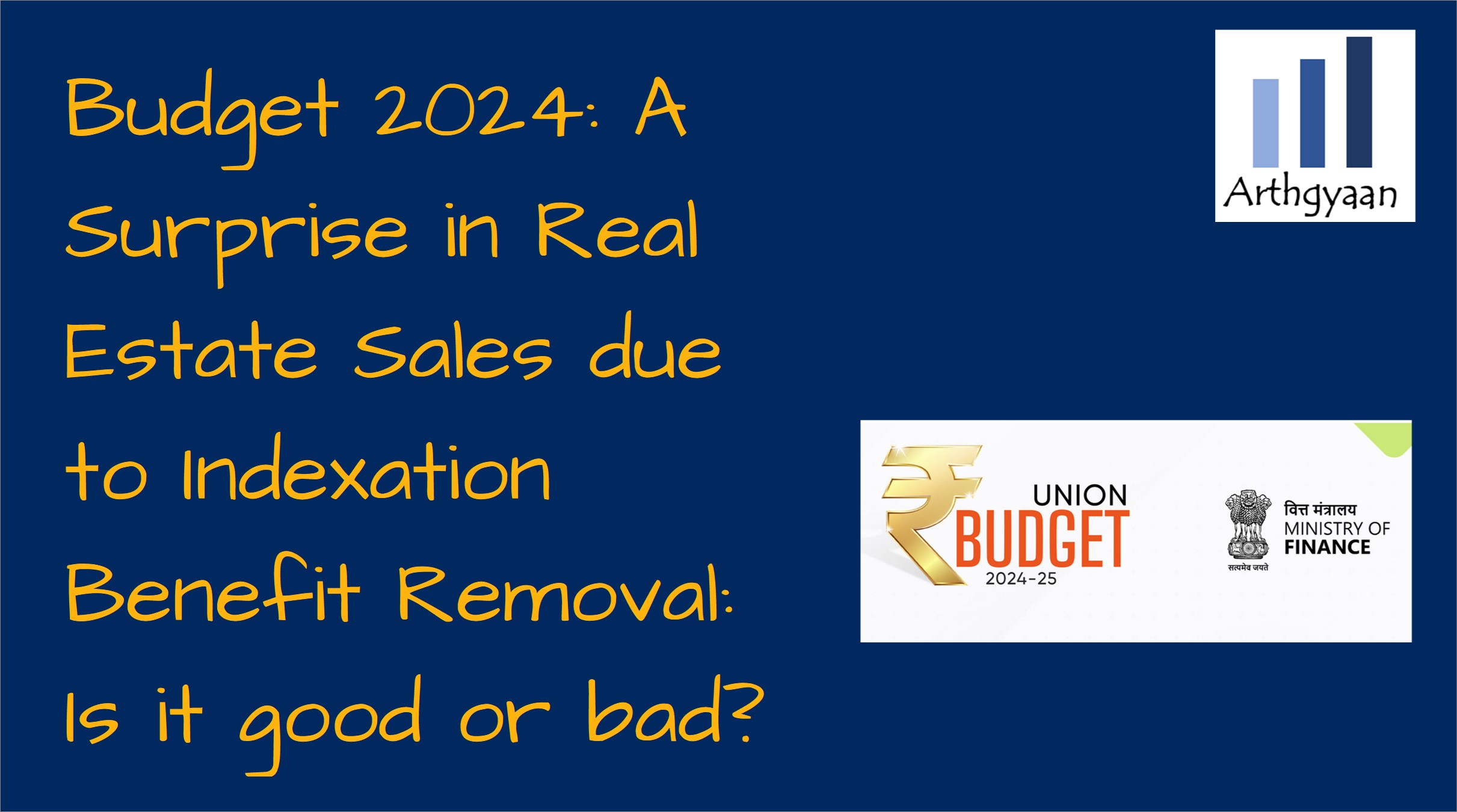Budget 2024: A Surprise in Real Estate Sales due to Indexation Benefit Removal: Is it good or bad?
This article analyses the change in taxation of real estate sales in India as per Union Budget 2024.
This article analyses the change in taxation of real estate sales in India as per Union Budget 2024.

Disclaimer: Taxation is a dynamic concept and the content of this article is valid on the date of publication and any subsequent updates. Always consult a professional tax advisor before doing anything that leads to taxes being due.
This article is a part of our detailed article series on Union Budget 2024. Ensure you have read the other parts here:
This article shows you the method for lowering the effect of Tax Collected at Source (TCS) on foreign remittances and travel via RBI’s Liberalised Remittance Scheme (LRS) as per new rules introduced under Union Budget 2024.
This article analyses the changes in Budget 2024 that impact investors investing abroad under the RBI’s Liberalised Remittance Scheme.
This article shows how you can now offset TCS against your salary’s TDS providing significant relief and improving your cash flow.
This article explains the new of the reversal of the 12.5% without indexation tax rule to allow 20% with indexation for all properties bought before 23rd July 2024.
This article helps you calculate the minimum price above which you must sell your property to pay lower taxes under the taxation rule change as per Budget 2024.
This article clarifies the indexation benefit available to property purchased before 2001 from official income tax authority sources.
This article discusses the impact on investors’ psyche due to impact on Gold price due to government policy change.
This article shows you how debt, international and gold/silver mutual funds will get taxed as per the new capital gains tax declared in the Union Budget 2024.
This article shows you how to do tax harvesting for shares and mutual funds as per the new capital gains tax declared in the Union Budget 2024.
This article analyses the most important changes affecting your portfolio as per the Union Budget 2024.
This article analyses the change in taxation of stocks and mutual funds as per the Union Budget 2024.
This article analyses the change in NPS-related tax deductions as per the Union Budget 2024.
This article describes how to use the Arthgyaan goal-based investing tool as a calculator to determine if switching to the New Tax Regime makes sense from 1st April 2024.
In a surprise move, Union Budget 2024 changed the capital gains taxation rules for real estate transactions:
The only things kept unchanged are:
This article will analyse these changes and help you decide if they are good or bad from your perspective.
You can lower the tax on long-term capital gains by using the concept of indexation. Indexation allows you to benefit from depreciation in the asset’s value due to inflation by adjusting the purchase price upwards by a factor published yearly by the Income Tax Department, called the Cost Inflation Index (CII). In general, assets with indexation benefit on the purchase price, irrespective of appreciation, will lead to lower taxes the longer they are held.
As the above table shows, it is easy to calculate the indexed purchase price. In the table above, an asset purchased in FY 2008-09 (CII = 137) and being sold in FY 2017-18 (CII = 272), will have an indexed purchase price of ₹198.54.
In Union Budget 2024, indexation has been removed but the capital gains tax rate has been reduced. Therefore, there exists a break-even point above which the post-23-Jul-2024 capital gains tax is better in the 12.5% without-indexation regime.
Note: In another surprise amendment to the Finance Bill on 6th August, 2024, the option of paying 20% tax on gains with indexation has been added to all properties acquired before Union Budget 2024 speech date of 23rd July, 2024. This means that for all such properties, including those purchased before 1st April 2001, the capital gains tax can be the lower of:
irrespective of the sale date thereby offering a grandfathering option for such properties. The exact amendment is this:
“where the income-tax computed .. exceeds the income-tax computed in accordance with the provisions of this Act, as they stood immediately before their amendment by the Finance (No. 2), Act, 2024, such excess will be ignored;”
If you read the text of the amendment carefully, then any loss cannot be offset or carried forward here since the amendment does not talk about losses. For properties acquired on or after 23rd July 2024, only the new 12.5% without indexation rule will apply.
We have covered the impact of this new change in detail here: Budget 2024 taxation rule reversal: grandfathering rule brings back indexation benefit to properties acquired before July 2024
Read more here: How Section 54EC helps you save tax when you sell property
You can save up to ₹10 crores in long-term capital gains by investing in another real estate unit. The allowed timelines are:
If the capital gains amount is not being used by 31st July, then it must be deposited in the Capital Gains Accounts Scheme (CGAS).
At the end of the day, you need to know the optimal selling price to minimise tax as explained below.
To understand should you sell your property now or later:
In the old 20%-on-indexed gains case, there is a threshold below which capital gains were zero or negative.
Profit post indexation = Selling price - (CII_selling_Year / CII_Purchase_Year) * Buying_Price
In this example, a property bought at ₹10 lakhs in 2006-07 and sold in 2024-25 below ₹29.8 lakhs did not pay any tax.
Here:
Indexed buying price = (363)/(122) * Buying_Price = 2.98x Buying price
So if sold below 2.98 * 10 lakhs = 29.8 lakhs would mean a loss and therefore no tax this year.
Here is the CII table for your reference:
| Serial # | Financial Year | CII | %ch | Worth of ₹1000 |
|---|---|---|---|---|
| 1 | 2001-02 | 100 | 0.00% | 1000 |
| 2 | 2002-03 | 105 | 5.00% | 952 |
| 3 | 2003-04 | 109 | 3.81% | 917 |
| 4 | 2004-05 | 113 | 3.67% | 885 |
| 5 | 2005-06 | 117 | 3.54% | 855 |
| 6 | 2006-07 | 122 | 4.27% | 820 |
| 7 | 2007-08 | 129 | 5.74% | 775 |
| 8 | 2008-09 | 137 | 6.20% | 730 |
| 9 | 2009-10 | 148 | 8.03% | 676 |
| 10 | 2010-11 | 167 | 12.84% | 599 |
| 11 | 2011-12 | 184 | 10.18% | 543 |
| 12 | 2012-13 | 200 | 8.70% | 500 |
| 13 | 2013-14 | 220 | 10.00% | 455 |
| 14 | 2014-15 | 240 | 9.09% | 417 |
| 15 | 2015-16 | 254 | 5.83% | 394 |
| 16 | 2016-17 | 264 | 3.94% | 379 |
| 17 | 2017-18 | 272 | 3.03% | 368 |
| 18 | 2018-19 | 280 | 2.94% | 357 |
| 19 | 2019-20 | 289 | 3.21% | 346 |
| 20 | 2020-21 | 301 | 4.15% | 332 |
| 21 | 2021-22 | 317 | 5.32% | 315 |
| 22 | 2022-23 | 331 | 4.42% | 302 |
| 23 | 2023-24 | 348 | 5.14% | 287 |
| 24 | 2024-25 | 363 | 4.31% | 275 |
| 25 | 2025-26 | 376 | 3.58% | 266 |
Now that the tax calculation rule has changed, we can calculate a minimum price level above which the new 12.5% without-indexation tax is lower.
As the table shows, a property sold in FY2024-25 for at least 4.13 times the purchase price (bought for ₹10 lakhs, sold for ₹41.3 lakhs etc.) will have lower tax under the new 12.5% rule. If you sell below this level, you will face a lot of regret since the older 20% with-indexation rule would have implied a lower amount of tax. Of course, while selling, the impact of circle rate is to be noted since you cannot sell below that value.
Minimum Selling Price = [( CII_selling_Year / CII_Purchase_Year ) * 8/3 - 5/3] * Purchase_Price
If you prefer to use a formula, then above is your minimum selling price, so that the new tax law is now better than the old one. Of course we are not adjusting for any cost of improvement in the interim. The table in the image above shows the same calculation.
If you simplify further, the formula becomes
Minimum profit % on selling the house = 8 / 3 * (CII change %)
where,
CII change % = ( CII_selling_Year / CII_Purchase_Year ) - 1
The above image applies the formula of minimum profit percentage. Using the table we see that if you sell a property bought in FY2010-11 in FY2024-25, then a minimum 313% profit will lead to a lower tax rate in the new rule under Union Budget 2024.
The detailed derivation of this formula is in this article: How to Calculate Sale Price of Property to Pay Lower Taxes after Budget 2024.
For properties purchased before 2001, your purchase price is as per the price computed by a government-approved property valuation expert. You can take the benefit of indexation if you want.
This calculation is explained in detail here: Budget 2024: Will indexation benefit apply to property purchased before 2001?

Published: 18 December 2025
8 MIN READ
1. Email me with any questions.
2. Use our goal-based investing template to prepare a financial plan for yourself.Don't forget to share this article on WhatsApp or Twitter or post this to Facebook.
Discuss this post with us via Facebook or get regular bite-sized updates on Twitter.
More posts...Disclaimer: Content on this site is for educational purpose only and is not financial advice. Nothing on this site should be construed as an offer or recommendation to buy/sell any financial product or service. Please consult a registered investment advisor before making any investments.
This post titled Budget 2024: A Surprise in Real Estate Sales due to Indexation Benefit Removal: Is it good or bad? first appeared on 23 Jul 2024 at https://arthgyaan.com